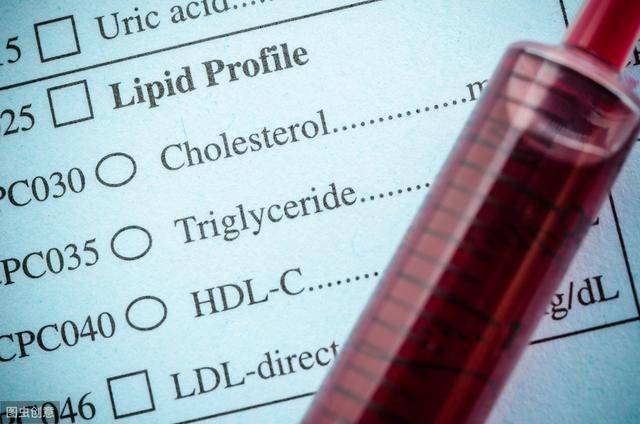An outpatient came, 44 years old, with elevated blood lipids, cholesterol 7.2, low density lipoprotein 4.2, triglycerides 8.8.
Later switched to a vegetarian diet, no meat for six months, now cholesterol is 6.9, triglycerides 2.1.
Triglycerides returned to normal, but cholesterol remains high, quite perplexed why, stopped eating meat but blood lipids haven’t normalized.
High blood lipids are a significant cause of cardiovascular diseases!
Simply put, high cholesterol, high low-density lipoprotein, high triglycerides can worsen vascular waste, exacerbate atherosclerosis, leading to narrowed blood vessels, causing myocardial ischemia, cerebral ischemia, even myocardial infarction, and stroke.
Elevated blood lipids are definitely related to eating meat, particularly red meat like pork, beef, lamb, and fatty meat containing high cholesterol, which will lead to increased blood lipids, but not eating meat does not guarantee normal blood lipids.
Causes of elevated blood lipids:
Human blood lipids mainly come from two sources: one major reason is consuming excessive fats and cholesterol, naturally leading to higher blood lipids. Additionally, genetic factors also contribute to abnormal metabolism. To be precise, saturated fatty acids elevate blood lipids; in simpler terms, animal-based foods such as fatty meat, animal fats, buttery pastries, palm oil, etc.; foods high in cholesterol such as animal organs, fish roe, squid, crab roe, etc.
Eating meat is not the sole reason for high blood lipids; trans unsaturated fatty acids can also raise bad low-density lipoproteins and lower good high-density lipoproteins; primary foods include pastries, deep-fried snacks, etc.
In summary, excessive consumption of fatty meat, red meat, animal fats, butter, animal organs, fried foods can lead to elevated blood lipids. Individuals with high triglycerides must not only control meat consumption but also moderate staple foods.
Exception for fish:
Many fish like mackerel, mahi-mahi, sardines, and some ocean fish contain Ω-3 fatty acids chiefly EPA and DHA, which reduce the risk of cardiovascular diseases. Fish fats are mostly unsaturated fatty acids, comprising essential amino acids, vitamins, rich iron, potassium, calcium, iodine, and other minerals and trace elements, making fish an indispensable healthy food. Additionally, consuming ocean fish to a certain extent aids in lipid metabolism, assisting in reducing blood lipids, hence a recommendation to eat fish moderately.
Blood lipids rise without eating meat:
Abstaining from meat does not guarantee low blood lipids; there are individuals whose blood lipids increase despite avoiding meat, similar to the man mentioned, whose blood lipids, especially cholesterol, remained elevated even after six months of no meat consumption due to abnormal intrinsic cholesterol and low-density lipoprotein synthesis reasons. Hence, certain individuals may experience blood lipid elevation despite avoiding meat.
In conclusion, individuals who consume meat generally have higher blood lipids compared to non-meat eaters, particularly those who prefer fatty meat, red meat, and organ meats must exercise portion control and monitor the levels of four blood lipids: cholesterol, low-density lipoprotein, high-density lipoprotein, and triglycerides.
Healthy eating is the foundation of health:
Regardless of blood lipid levels, one should maintain a healthy diet, especially after blood lipid elevation.
1. Whole grains: healthy foods like legumes, oats, brown rice, whole grain bread, potatoes, pumpkins, etc.; starch is rich in nutrients and fiber, consuming a high-fiber diet (whole grains) can reduce total cholesterol and raise high-density lipoproteins. Avoid solely consuming refined grains like white bread, cakes, white steamed buns, etc.
2. Dietary fiber: a modern nutrient that promotes gastrointestinal peristalsis, prevents constipation, delays gastric emptying, reduces sugar absorption, and aids in weight control.
3. Plant sterols: mainly sourced from vegetable oils, nuts, fruits, and vegetables; consume fresh seasonal fruits and plant-based foods. Moreover, foods like garlic, onions, black fungus, hawthorn, kelp, konjac, etc., aid in lipid metabolism; though consuming them is beneficial, they should not constitute the entire diet.
4. Ω-3 fatty acids: primarily found in tuna, sardines, some marine fish, and flaxseed oil.
Even though abstaining from meat can lead to elevated blood lipids, individuals who consume meat, especially those fond of red meat, fatty meat like pork, beef, lamb, are more susceptible to increased blood lipids. Therefore, meat consumption should be moderated, emphasizing fish consumption and skinless chicken.
Healthy eating habits should begin from childhood; all cardiovascular diseases gradually develop, closely linked to our daily diet!
Three meals a day, healthy eating habits, no compromises!
Like this patient who normalized triglycerides after six months without meat, yet cholesterol remains elevated. Considering the specific situation of the patient, as they do not have clear cardiovascular diseases or diabetes, and with low-density lipoproteins below 4.9, it is advised for the patient to continue leading a healthy lifestyle and monitoring their condition.
However, it’s still acceptable to eat meat, as long as it’s done healthily, no issues!
【Cardiovascular King Doctor Copyright】
#CleanBreezePlan#


